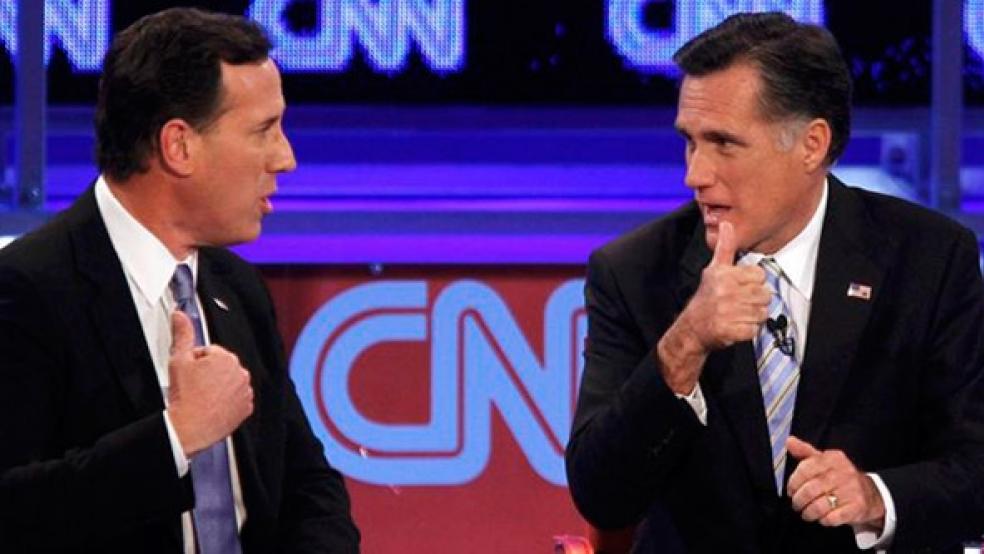Presidential hopeful Rick Santorum found himself under attack by his rivals for supporting hundreds of millions in earmarks, including the notorious “Bridge to Nowhere,” and for contributing to a major increase in overall federal spending.
Faced with the prospects of losing in his home state of Michigan, Mitt Romney joined forces with Ron Paul at Wednesday night’s GOP presidential debate in Arizona to pillory Santorum as a “fake” fiscal conservative – someone who voted five times to raise the federal debt ceiling and who routinely backed massive spending bills that included funding for Planned Parenthood.
In light of the intense media buildup over Santorum’s provocative statements in recent weeks on everything from contraception to the efficacy of public schools to President Obama’s “phony theology,” the debate in Arizona sponsored by CNN promised an intense discussion of religious and conservative social issues.
While surveys consistently show that voters across the country are mainly concerned with the economy and jobs, Santorum has appealed to conservative and blue collar voters with a message of family values, unbending opposition to abortion and contraception, and relentless attacks on President Obama for his intrusive government policies.
But social issues took a back seat to differences over government and the deficit, the federal bailouts of Wall Street and the auto industry, immigration and the Iranian nuclear threat. These were all topics well within Romney’s comfort zone, and frequently he appeared better prepared and more crisp in his delivery Santorum and the others.
Romney defended his comment during a speech at the Conservative Political Action Conference this month that he had a “severely conservative” record as governor of Massachusetts. Asked to clarify, Romney responded, “Severe. Strict. I was without question a conservative governor in my state.”
When CNN’s John King tried to ask a question about abortion, the crowd booed. King later reminded Santorum that while campaigning in Iowa, he promised that as president, he would talk about what no other president has discussed, “the dangers of contraception.”
Santorum said that he was simply bringing up a subject that others, including author Charles Murray and New York Times reporters have also raised, which is the increasing number of children being born out of wedlock and the social and economic consequences of the “fracturing of the family.”
“The left gets all upset,” Santorum said during a brief discussion of the controversy. “They say, ‘Oh, look at him talking about these things.’ You know, here’s the difference between me and the left, and they don’t get this. Just because I’m talking about it doesn’t mean I want a government program to fix it. That’s what they do. That’s not what we do.”
Romney jumped in to support Santorum: “As Rick has just said, this isn’t about contraceptives, this is a discussion about are we going to have a nation which preserves the foundation of the nation, which is the family, or not?”
Santorum and Romney later butted heads about their government bailout philosophies. Santorum said while he recognized the auto industry could have weathered heavier blows without the 2008 government bailouts, his faith in markets led him to oppose that along with the Troubled Asset Relief Program, otherwise known as the Wall Street bank bailout. “I believe in markets, not just when they’re convenient for me,” Santorum said, jabbing at Romney, who did support TARP.
Romney responded by saying that if the government didn’t step in to aid the large financial institutions, that he feared smaller banks would take a hit. The former Massachusetts governor also towed a cautious line in explaining his opposition to the $14 billion auto industry bailout-- a particularly sensitive subject in his home state of Michigan.
He said that he favored General Motors and Chrysler going through a managed bankruptcy without a massive infusion of federal funding, but that the government would “provide guarantees and get them back on their feet” coming out of the bankruptcy. While critics say Romney’s approach never would have worked without the Obama administration providing the necessary financing, Romney said, “No way would we allow the auto industry in America to totally implode and disappear.”
One point of near unanimity was the Republican candidates’ determination to stand by Israel and, if necessary, support a preemptive strike against Iran to keep that radical Islamic state from developing a nuclear weapon. Former House Speaker Newt Gingrich left little doubt that if he were in the White House and “an Israeli prime minister calls” to say Iran is posing an imminent threat to that country’s existence, “I do believe there are times when you preempt.”
If Santorum manages to topple Romney in next Tuesday’s primaries in Michigan and Arizona, Romney would likely head into a tailspin that would take him out of the race, while Santorum would likely go on to lock up the GOP presidential nomination. Even a win in Arizona and a narrow loss in Michigan could spell bad news for Romney.
But Romney may not be in as much trouble in Arizona as some of the experts said he was, according to a new poll from NBC News and Marist College, but he’s still slugging it out with Santorum in Michigan. A newly released NBC/Marist polls show Romney leading Santorum, 43 percent to 27 percent, in Arizona, and 37 percent to 35 percent in Michigan – or essentially a statistical dead heat. The new poll is the first to show Romney leading in Michigan in a while.
Last night’s debate was the 20th GOP encounter and may be the last of the 2012 primary season.






